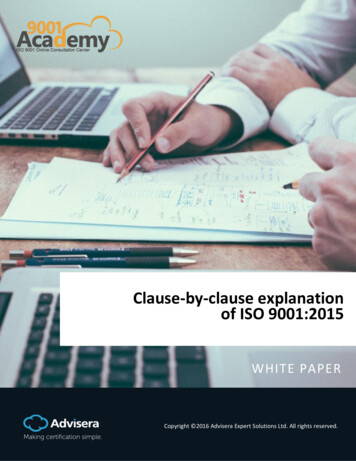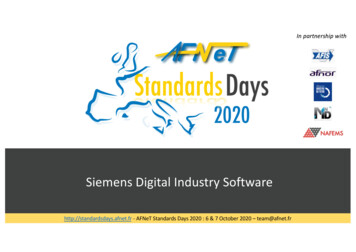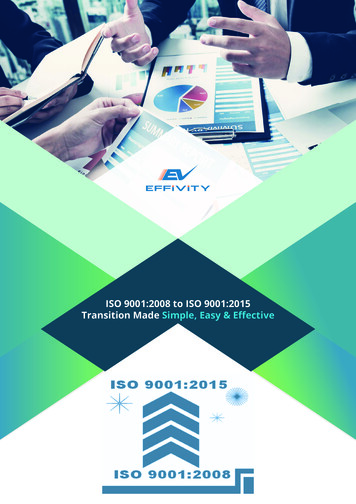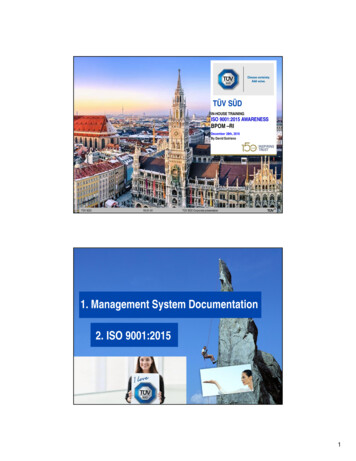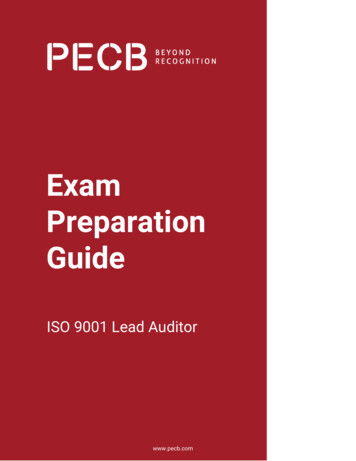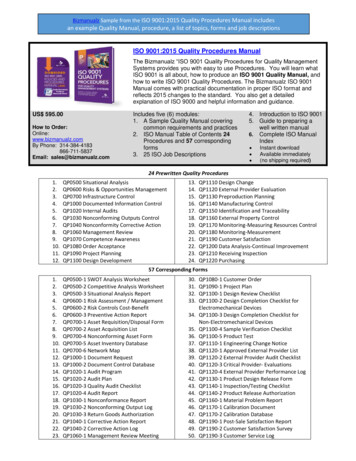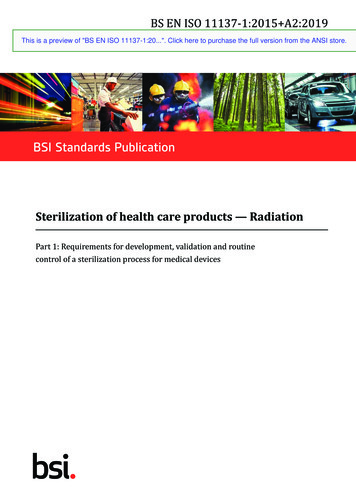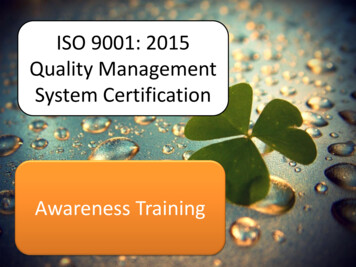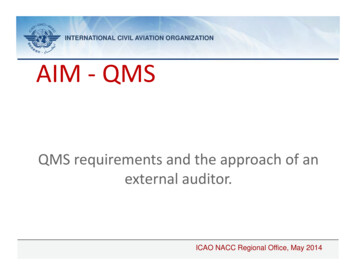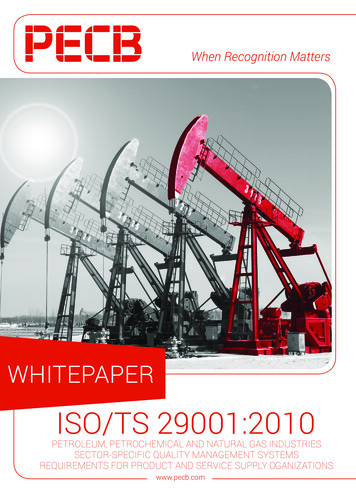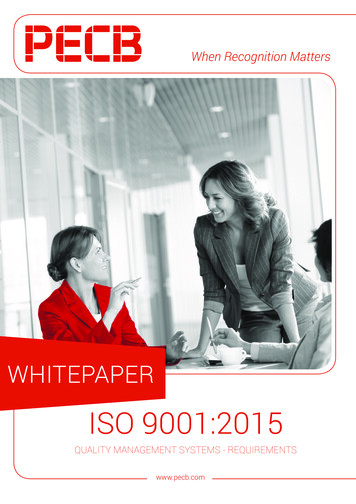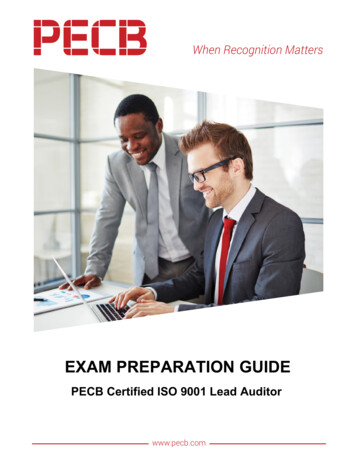
Transcription
When Recognition MattersEXAM PREPARATION GUIDEPECB Certified ISO 9001 Lead Auditorwww.pecb.com
PECB-820-5- ISO 9001-LA-Exam Preparation GuideThe objective of the “PECB Certified ISO 9001 Lead Auditor” examination is to ensure that thecandidate possesses the necessary expertise to perform a Quality Management System (QMS)audit and to manage an audit team by applying widely recognized audit principles, proceduresand techniques. The aim of the exam is to evaluate that the candidate possesses theknowledge and skills to proficiently plan and carry out internal and external audits in compliancewith ISO 19011 and ISO/IEC 17021-1 certification process.The target population for this examination is: Auditors seeking to perform and lead Quality Management System (QMS) certificationauditsManagers or consultants seeking to master a Quality Management System auditprocessIndividuals responsible for maintaining conformance with QMS requirementsTechnical experts seeking to prepare for a Quality Management System auditExpert advisors in Quality ManagementThe exam content covers the following competency domains: Domain 1: Fundamental principles and concepts of a Quality Management System (QMS)Domain 2: Quality Management System (QMS)Domain 3: Fundamental audit concepts and principlesDomain 4: Preparation of an ISO 9001 auditDomain 5: Conducting an ISO 9001 auditDomain 6: Closing an ISO 9001 auditDomain 7: Managing an ISO 9001 audit programPage 2 of 15
PECB-820-5- ISO 9001-LA-Exam Preparation GuideThe content of the exam is divided as follows:Domain 1: Fundamental principles and concepts of a QualityManagement System (QMS)Main objective: To ensure that the ISO 9001 Lead Auditor candidate can understand, interpretand illustrate the main Quality Management concepts related to a Quality Management System(QMS).CompetenciesKnowledge statements1. Understand and explain the operations of theISO organization and the development ofQuality Management standards.2. Ability to identify, analyze and evaluate theQuality Management compliance requirementsfor an organization.3. Understand the Quality Management tools andtechniques.4. Ability to explain and illustrate the mainconcepts in Quality Management.1. Knowledge of the application of the seven ISO2.3.4.5.management principles in Quality Management.Knowledge of the main standards in QualityManagement.Knowledge of the different sources of QualityManagement requirements for an organization,including: laws, regulations, international andindustry standards, contracts, market practices,internal policies.Knowledge of Quality Circles, Total QualityManagement, Six Sigma, Lean, Kaizen, Just-inTime, etc.Knowledge of the main Quality Managementconcepts and terminology as described in ISO9001.6. Knowledge of the concepts of process approachand risk-based thinking in Quality Management.Page 3 of 15
PECB-820-5- ISO 9001-LA-Exam Preparation GuideDomain 2: Quality Management Systems (QMS)Main objective: To ensure that the ISO 9001 Lead Auditor candidate can understand, interpret andillustrate the main concepts and components of a Quality Management System based on ISO 9001.CompetenciesKnowledge statements1. Understand and explain the components of aQuality Management System based on ISO9001 and its principal processes.2. Ability to interpret and analyze the requirementsof ISO 9001.3. Understand, explain and illustrate the mainsteps to establish, implement, operate, monitor,review, maintain and improve an organization’sQMS.1. Knowledge of the concepts, principles andterminology related to management systems andthe "Plan-Do-Check-Act" (PDCA) model.2. Knowledge of the principal characteristics of anintegrated management system.3. Knowledge of the main advantages of acertification for an organization.4. Knowledge of the ISO 9001 requirementspresented in clauses 4 to 10.5. Knowledge of the main steps to establish the QMS,policies, objectives, processes and proceduresrelevant to managing risk and improving QualityManagement to deliver results in accordance withan organization’s overall policies and objectives(awareness level).6. Knowledge of the concept of continualimprovement and its application to a QMS.Page 4 of 15
PECB-820-5- ISO 9001-LA-Exam Preparation GuideDomain 3: Fundamental audit concepts and principlesMain objective: To ensure that the ISO 9001 Lead Auditor candidate can understand, interpret andapply the main concepts and principles related to a QMS audit in the context of ISO 9001.CompetenciesKnowledge statements1. Understand, explain andillustrate theapplication of the audit principles in the contextof an ISO 9001 audit.2. Ability to identify and judge situations that woulddiscredit the professionalism of the auditor andthe PECB Code of Ethics.3. Ability to identify and evaluate ethical problemstaking into account the obligations related to theaudit client, auditee, and law enforcement andregulatory authorities.4. Ability to explain, illustrate and apply the auditevidence approach in the context of an ISO9001 audit.5. Ability to explain and compare the types andcharacteristics of evidence.6. Ability to determine and justify what type ofevidence and how much evidence will berequired in the context of a specific QMS auditmission.7. Ability to determine and evaluate the level ofmateriality and apply the risk based approachduring the different phases of an ISO 9001audit.8. Ability to judge the appropriate level ofreasonable assurance needed for a specific ISO9001 audit mission.1. Knowledge of the main audit concepts andterminology as described in ISO 19011.2. Knowledge of the differences between first party,second party and third party audits.3. Knowledge of the following audit principles:integrity, fair presentation, due professional care,professional judgment, professional skepticism,confidentiality and independence.4. Knowledge of the professional responsibility of anauditor and the PECB Code of Ethics.5. Knowledge of evidence based approach in anaudit.6. Knowledge of the different types of evidences:physical, mathematical, confirmative, technical,analytical, documentary and verbal.7. Knowledge of the quality of audit evidences(competent, appropriate, reliable and sufficient)and the factors that will influence them.8. Knowledge of the risk-based approach in an auditand the different types of risks related to auditactivities.9. Knowledge of the concept of materiality and itsapplication in an audit.10. Knowledge of the concept of reasonableassurance and its applicable in an audit.Page 5 of 15
PECB-820-5- ISO 9001-LA-Exam Preparation GuideDomain 4: Preparation of an ISO 9001 auditMain objective: To ensure that the ISO 9001 Lead Auditor candidate can prepare a QMS audit inthe context of ISO 9001 appropriately.CompetenciesKnowledge statements1. Understand and explain the steps and activitiesto prepare a QMS audit taking intoconsideration the specific context andconditions of the audit mission.2. Understand and explain the roles andresponsibilities of the audit team leader, auditteam members and technical experts.3. Ability to determine, evaluate and confirm theaudit objectives, the audit criteria and the auditscope for a specific ISO 9001 audit mission.4. Ability to conduct a feasibility study of an auditin the context of a specific ISO 9001 auditmission.5. Ability to explain, illustrate and define thecharacteristics of the audit terms of engagementand apply the best practices to establish a firstcontact with an auditee in the context of aspecific ISO 9001 audit mission.6. Ability to develop audit working papers andelaborate appropriate audit test plans in thecontext of a specific ISO 9001 audit mission.1. Knowledge of the main responsibilities of the auditteam leader and audit team members.2. Knowledge of the roles and responsibilities oftechnical experts in an audit.3. Knowledge of the definition of audit objectives,audit scope and audit criteria.4. Knowledge of the difference between the QMSscope and the audit scope.5. Knowledge of the elements to review during thefeasibility study of an audit.6. Knowledge of the cultural aspects to consider in anaudit.7. Knowledge of the characteristics of audit terms ofengagement and the best practices to establish afirst contact with an auditee.8. Knowledge of the preparation of an audit plan.9. Knowledge of the preparation and development ofaudit working papers.10. Knowledge of the advantages and disadvantagesof using audit checklists.11. Knowledge of the best practices for the creation ofaudit test plans.Page 6 of 15
PECB-820-5- ISO 9001-LA-Exam Preparation GuideDomain 5: Conducting an ISO 9001 auditMain objective: To ensure that the ISO 9001 Lead Auditor candidate can efficiently conduct aQMS audit in the context of ISO 9001.CompetenciesKnowledge statements1. Ability to organize and conduct the openingmeeting in the context of a specific ISO 9001audit mission.2. Ability to conduct a stage 1 audit in the contextof a specific ISO 9001 audit mission and takinginto account the documentation reviewconditions and criteria.3. Ability to conduct a stage 2 audit in the contextof a specific ISO 9001 audit mission by applyingthe best practices of communication to collectthe appropriate evidence and taking intoaccount the roles and responsibilities of allpeople involved.4. Ability to explain, illustrate and apply statisticaltechniques and main audit sampling methods.5. Ability to objectively gather appropriateevidence from the available information duringan audit and evaluate it objectively.1. Knowledge of the objectives and the content ofthe opening meeting of an audit.2. Knowledge of the difference between stage 1audit and stage 2 audit.3. Knowledge of stage 1 audit requirements, stepsand activities.4. Knowledge of the documentation review criteria.5. Knowledge of the documentation requirementsstated in ISO 9001.6. Knowledge of stage 2 audit requirements, stepsand activities.7. Knowledgeofthebestpracticesofcommunication during an audit.8. Knowledge of the roles and responsibilities ofguides and observers during an audit.9. Knowledge of the conflict resolution techniques.10. Knowledge of evidence collection procedures:observation, documentation review, interviews,analysis and technical verification.11. Knowledge of evidence analysis procedures:corroboration and evaluation.12. Knowledge of the main concepts, principles andstatistical techniques used in an audit.13. Knowledge of the main audit sampling methodsand their characteristics.Page 7 of 15
PECB-820-5- ISO 9001-LA-Exam Preparation GuideDomain 6: Closing an ISO 9001 auditMain objective: To ensure that the ISO 9001 Lead Auditor candidate can conclude a QMS auditand conduct follow-up activities in the context of ISO 9001.CompetenciesKnowledge statements1. Ability to explain and apply the evaluationprocess of evidences to draft audit findings andprepare audit conclusions.2. Understand, explain and illustrate the differentlevels of conformity and the concept of thebenefit of the doubt.3. Ability to report appropriate audit observationsin order to help an organization improve a QMSwith respect to audit rules and principles.4. Ability to complete audit working documents andconduct a quality review of an ISO 9001 audit.5. Ability to draft audit conclusions and presentthese to the management of the auditedorganization.6. Ability to organize and conduct an audit closingmeeting.7. Ability to write an ISO 9001 audit report andjustify a certification recommendation.8. Ability to conduct the activities following aninitial audit including the evaluation of actionplans, follow-up audits, surveillance.1. Knowledge of the evaluation process of evidencesto draft audit findings and prepare auditconclusions.2. Knowledgeofthedifferencesandthecharacteristics between the concepts of nomaly and observation.3. Knowledge of the guidelines and best practices towrite nonconformity reports.4. Knowledge of the guidelines and best practices todraft and report audit observations.5. Knowledge of the principle of the benefit of thedoubt and its application in the context of an audit.6. Knowledge of the guidelines and best practices tocomplete audit working documents and perform aquality review of an audit.7. Knowledge of the guidelines and best practices topresent audit findings and conclusions to themanagement of an audited organization.8. Knowledge of the possible recommendations thatan auditor can issue in the context of a certificationaudit and the certification decision process.9. Knowledge of the guidelines and best practices toevaluate action plans.10. Knowledge of follow-up audits, surveillance auditsand recertification audit requirements, steps andactivities.11. Knowledge of the conditions for modification,extension, suspension or withdrawal of acertification for an organization.Page 8 of 15
PECB-820-5- ISO 9001-LA-Exam Preparation GuideDomain 7: Managing an ISO 9001 audit programMain objective: To ensure that the ISO 9001 Lead Auditor understands how to establish andmanage a QMS audit program.CompetenciesKnowledge statements1. Understand and explain the establishment of anaudit program and the application of the PDCAmodel.2. Understand and explain the implementation ofan ISO 9001 audit program (first party, secondparty and third party).3. Understand and explain the responsibilities ty of audit records.4. Understand the requirements related to thecomponents of the management system of anaudit program as quality management, recordmanagement, and complaint management.5. Understand the evaluation of the efficiency ofthe audit program by monitoring theperformance of each auditor, each team and theentire certification body.6. Ability to demonstrate the application of thepersonal attributes and behaviors associatedwith professional auditors.1. Knowledge of the application of the PDCA model inthe management of an audit program.2. Knowledge of the requirements, guidelines andbest practices regarding audit resources,procedures and policies.3. Knowledge of the types of tools used byprofessional auditors.4. Knowledge of the requirements, guidelines andbest practices regarding the management of auditrecords.5. Knowledge of the application of the concept ofcontinual improvement to the management of anaudit program.6. Knowledge of the particularities to implement andmanage a first, second or third party auditprogram.7. Knowledge of the management of combined auditactivities.8. Knowledge of the concept of competency and itsapplication to auditors.9. Knowledge of the personal attributes and behaviorof a professional auditor.Page 9 of 15
PECB-820-5- ISO 9001-LA-Exam Preparation GuideBased on these 7 domains and their relevance, twelve (12) questions are included in the exam,as summarized in the following table:Level of alprinciples andconcepts of aQualityManagementSystem (QMS)QualityManagementSystem (QMS)Competency DomainsFundamentalaudit conceptsand principlesPreparation of anISO 9001 AuditPoints perQuestionQuestions thatmeasureComprehension,Application andAnalysis5X10X5X5X5X55Conducting anISO 9001 auditClosing an ISO9001 AuditManaging an ISO9001 auditprogramTotal pointsQuestionsthat measureSynthesisandEvaluationNumber ofQuestionspercompetencydomain% of testdevoted toeachcompetencydomainNumber ofPoints percompetencydomain% of .3356.6710X18.331013.3375Number of Questions per level ofunderstanding% of Test Devoted to each level ofunderstanding (cognitive/taxonomy)7558.3341.67The passing score is 70%.After successfully passing the exam, candidates will be able to apply for the credential of “PECBCertified ISO 9001 Lead Auditor”, depending on their level of experience.Page 10 of 15
PECB-820-5- ISO 9001-LA-Exam Preparation GuideTAKE A CERTIFICATION EXAMCandidates will be required to arrive at least thirty (30) minutes before the beginning of thecertification exam. Candidates that arrive late will not be given additional time to compensate forthe late arrival, and may be denied entry to the exam room (if they arrive more than 5 minutesafter the beginning of the exam scheduled time).All candidates will need to present a valid identity card with a picture such as a driver’s licenseor a government ID to the invigilator.The exam duration is three (3) hours.The questions are essay type questions. This type of format was chosen because the intentis to determine whether an examinee can write a clear coherent answer/argument and toassess problem solving techniques. Because of this particularity, the exam is set to be “openbook” and does not measure the recall of data or information. The examination evaluatescomprehension, application, analysis, synthesis and evaluation, which means that even if theanswer is in the course material, candidates will have to justify and give explanations, to showthey really understood the concepts. At the end of this document, you will find sample examquestions and their possible answers.As the exams are “open book”; candidates are only authorized to use: A copy of the ISO 9001:2015 standard;Course notes from the Participant Handout;Any personal notes made by the student during the course; andA hard copy dictionary.The use of electronic devices, such as laptops, cell phones, etc., is not allowed.All attempts to copy, collude or otherwise cheat during the exam will automatically lead to adisqualification.PECB exams are available in English. For availability of the exam in a language other thanEnglish, please contact examination@pecb.com.Page 11 of 15
PECB-820-5- ISO 9001-LA-Exam Preparation GuideRECEIVE YOUR EXAM RESULTSResults will be communicated by email in a period of 6 to 8 weeks, after taking the exam. Theresults will not include the exact grade of the candidate, only a mention of pass or failCandidates who successfully complete the examination will be able to apply for a certifiedscheme.In case of a failure, the results will be accompanied with the list of domains in which thecandidate had a low grade, to provide guidance for exams’ retake preparation.Candidates who disagree with the exam results may file a complaint by writing toexamination@pecb.com. For more information, please refer to www.pecb.com.EXAM RETAKE POLICYThere is no limit on the number of times a candidate may retake an exam. However, there aresome limitations in terms of allowed time-frame in between exam retakes, such as: If a candidate does not pass the exam on the first attempt, he/she must wait 15 days forthe next attempt (1st retake). Retake fee applies.Note: Students, who have completed the full training but failed the written exam, are eligible toretake the exam once for free within a 12 month period from the initial date of the exam. If a candidate does not pass the exam on the second attempt, he/she must wait 3months (from the initial date of the exam) for the next attempt (2nd retake). Retake feeapplies. If a candidate does not pass the exam on the third attempt, he/she must wait 6 months(from the initial date of the exam) for the next attempt (3rd retake). Retake fee applies.After the fourth attempt, a waiting period of 12 months from the last session date is required, inorder for candidate to sit again for the same exam. Regular fee applies.For the candidates that fail the exam in the 2nd retake, PECB recommends to attend an officialtraining in order to be better prepared for the exam.To arrange exam retakes (date, time, place, costs), the candidate needs to contact the PECBpartner who has initially organized the session.Page 12 of 15
PECB-820-5- ISO 9001-LA-Exam Preparation GuideCLOSING FILESClosing a file is equivalent to rejecting a candidate’s application. As a result, when candidatesrequest that their file be reopened, PECB will no longer be bound by the conditions, standards,policies, candidate handbook or exam preparation guide that were in effect before their file wasclosed.Candidates who want to request that their file be reopened must do so in writing, and pay therequired fees.EXAMINATION SECURITYA significant component of a successful and respected professional certification credential ismaintaining the security and confidentiality of the examination. PECB relies upon the ethicalbehaviour of certificate holders and applicants to maintain the security and confidentiality ofPECB examinations. When someone who holds PECB credentials reveals information aboutPECB examination content, they violate the PECB Code of Ethics. PECB will take actionagainst individuals who violate PECB Policies and the Code of Ethics. Actions taken mayinclude permanently barring individuals from pursuing PECB credentials and revokingcertifications from those who have been awarded the credential. PECB will also pursue legalaction against individuals or organizations who infringe upon its copyrights, proprietary rights,and intellectual property rights.Page 13 of 15
PECB-820-5- ISO 9001-LA-Exam Preparation GuideSAMPLE EXAM QUESTIONS AND POSSIBLE ANSWERS1. Evaluation of corrective actionsYou have received a corrective action plan. Please evaluate the adequacy of the proposedcorrective actions. If you agree with the corrective actions, please explain why. If you disagree,please explain why and propose the adequate corrective action.--Nonconformity: A nonconformity was observed because the Human Resources teamwas not aware of a procedure that requires them to record the education, training, andexperience of all employees.Corrective action: Inform (Timeframe: immediately) and train (Timeframe: within 6months) the Human Resources team about this procedure and require that eachmember of the team follow it.Possible answer:I agree. This solves the problem of a lack of knowledge about the existence of a procedure. Asan auditor, a sampling will be performed during the surveillance audit to find out if the procedureis followed correctly.2. Writing of a test planWrite a test plan to validate the following clause identifying the different applicable auditprocedures (observation, documentation review, interview, technical verification and analysis):-Clause 7.5.3 Control of documented information:Documented information required by the quality management system and by ISO 9001shall be controlled to ensure:o it is available and suitable for use, where and when it is needed;o it is adequately protected (e.g. from loss of confidentiality, improper use or loss ofintegrity).Possible answer:Clause 7.5.3 Control of documented information:Documented information required by the quality management system and by ISO 9001shall be controlled to ensure: it is available and suitable for use, where and when it is needed; it is adequately protected (e.g. from loss of confidentiality, improper use or loss ofintegrity).ObservationObserve how employees ensure the protection of documentedinformation and whether those actions are consistent with theorganization’s policies and procedures.Page 14 of 15
PECB-820-5- ISO 9001-LA-Exam Preparation sPolicy on documented information management and procedures oninformation lifecycle management: their identification, storage,backup, protection, accessibility and conservation.Member of management (to confirm the policies and theorganization’s needs related to documented information) and thepersonnel responsible for information management and archiving (toobtain the documented information management details).Validate the electronic structure for classifying and storingdocumented information, verify their protection mechanisms, andobserve the compilation of the automated journals report.Select documented information samples and verify if they respectthe documentation structure and policy criteria on documentedinformation.Page 15 of 15
PECB-820-5- ISO 9001-LA-Exam Preparation Guide Page 5 of 15 Domain 3: Fundamental audit concepts and principles Main objective: To ensure that the ISO 9001 Lead Auditor candidate can understand, interpret and apply the main concepts and principles related to
